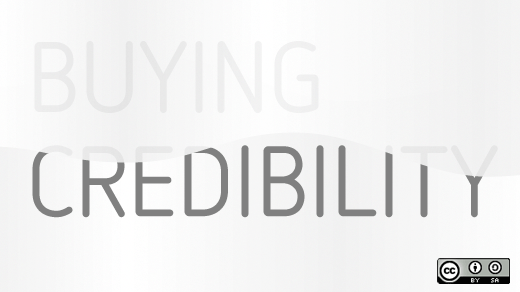Recently Bob Sutton, author of Good Boss, Bad Boss, received a suspicious request via email:
My name is Samantha and I work for a management consulting firm. We are currently in the process of growing our online presence and would like to know if we would be able to sponsor your upcoming post. The sponsorship is not a product review but rather a mention within the body or the byline of the post. Do you think we would be able to work something out?
Like most of his readers I felt a bit uneasy upon reading it. As I questioned myself, I settled on two reasons for my discomfort:
1. The management consulting firm is unnamed.
No blogger worth sponsoring will want to stake his or her reputation on an unnamed company. Especially for $75. Business folks, be upfront about who you are--especially if you have nothing to hide.
2. The “sponsorship” details are vague.
Samantha is not clear in her initial email as to whether this is a transparent paid sponsorship or simply an under-the-table paid link placement scheme. The former is a reasonable proposition; the latter is not only sketchy: it's also illegal. The FTC now requires transparency in paid endorsements.
Gone are the days--and good riddance--when a company could buy significant credibility via positive attention from high profile bloggers. But that doesn't mean bloggers can't provide advertising space or even product endorsements. It just means you have to be honest about what you're doing.
So, if you're reviewing a product that a company sent you for free, tell your readers just that. A random search for FTC-compliant product reviews yielded this excellent example (with perhaps the greatest URL ever) and this one (ew), which will give you some ideas on how to be seamless and transparent.
If you're mentioning a business in a blog post because they've sent you money to be a sponsor, be open about it. Daring Fireball, who makes a handsome sum on his weekly site sponsorships, includes a clearly labeled ad in his RSS feed each week:
[Sponsor] RipIt
from Daring Fireball by Daring Fireball Department of Commerce
The award-winning Mac DVD ripper, RipIt, is here. Rip any DVD into your preferred format for viewing on all your favorite devices or copy directly to your iPad with the simple one-button design. We at TLAF would like to extend the opportunity to Daring Fireball readers to purchase the application for 25% off with the code [...]
There are ways to do these things that don't mislead others but still provide revenue for bloggers. I'm curious to hear from my readers:
- What sorts of income-generation do you like or dislike seeing on your favorite blogs?
- How do you regard companies that advertise this way?
- Do you agree or disagree with the new FTC regulations?






Comments are closed.